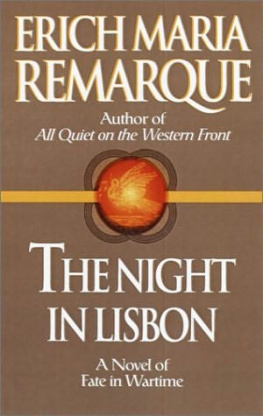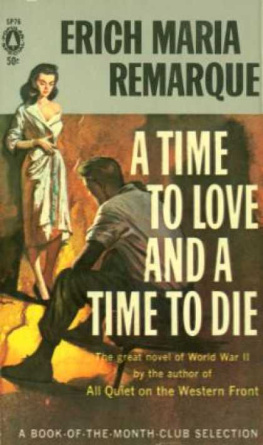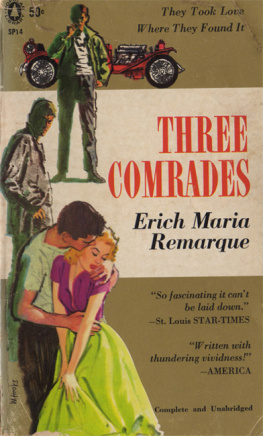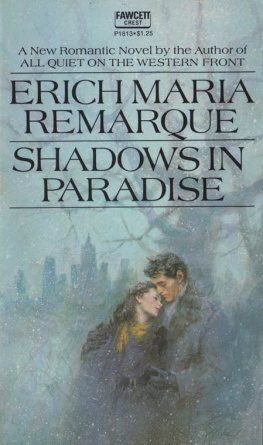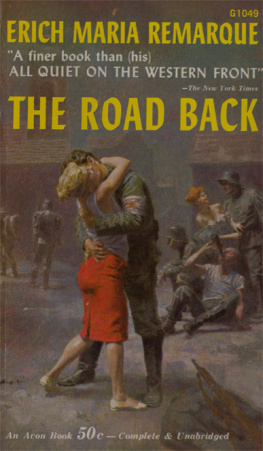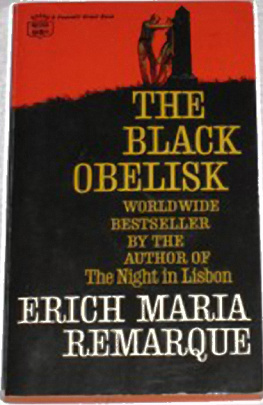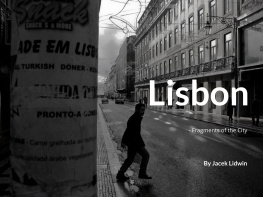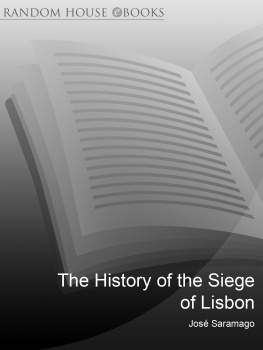ERICH MARIA REMARQUE, who was born in Germany, was drafted into the German army during World War I. Through the hazardous years following the war he worked at many occupationsschoolteacher, small-town drama critic, racing driver, editor of a sports magazine. His first novel, All Quiet on the Western Front, was published in Germany in 1928. A brilliant success, selling over a million copies, it was the first of many literary triumphs. When the Nazis came to power, Remarque left Germany for Switzerland. He rejected all attempts to persuade him to return, and as a result he lost his German citizenship, his books were burned, and his films banned. He went to the United States in 1938 and became a citizen in 1947. He later lived in Switzerland with his second wife, the actress Paulette Goddard. He died in September 1970.
CHAPTER 1
I stared at the ship. Glaringly lighted, it lay at anchor in the Tagus. Though I had been in Lisbon for a week, I hadn't yet got used to its carefree illumination. In the countries I had come from, the cities at night were black as coal mines, and a lantern in the darkness was more to be feared than the plague in the Middle Ages. I had come from twentieth-century Europe.
The ship was a passenger vessel; it was being loaded. I knew it was going to sail the next afternoon. In the harsh glow of the naked light bulbs, crates of meat, fish, canned goods, bread, and vegetables were being lowered into the hold; stevedores were carrying baggage on board, lifting up crates and bales as silently as if they had been weightless. The ship was being made ready for a voyagelike the ark in the days of the flood. It was an ark. Every ship that left Europe in those months of the year 1942 was an ark. Mount Ararat was America, and the flood waters were rising higher by the day. Long ago they had engulfed Germany and Austria, now they stood deep in Poland and Prague; Amsterdam, Brussels, Copenhagen, Oslo, and Paris had gone under, the cities of Italy stank of seepage, and Spain, too, was no longer safe. The coast of Portugal had become the last hope of the fugitives to whom justice, freedom, and tolerance meant more than home and livelihood. This was the gate to America. If you couldn't reach it, you were lost, condemned to bleed away in a jungle of consulates, police stations, and government offices, where visas were refused and work and residence permits unobtainable, a jungle of internment camps, bureaucratic red tape, loneliness, homesickness, and withering universal indifference. As usual in times of war, fear, and affliction, the individual human being had ceased to exist; only one thing counted: a valid passport.
That afternoon I had gone to the Casino Estoril to gamble. I still owned a good suit, and they had let me in. It was a last, desperate effort to blackmail fate. Our Portuguese residence permit would expire in a few days, and Ruth and I had no other visas. We had made our plans in France and drawn up a list of possible sailings for New York. This ship anchored in the Tagus had been the last on our list. But it was sold out for months; we had no American visas, and we were more than three hundred dollars short of the fare. I had tried to raise the money at least, in the only way still possible for a foreigner in Lisbonby gambling. An absurd idea, for even if I had won, it would have taken a miracle to get us aboard. But in danger and despair you acquire a faith in miracles; without it you would go under.
I had lost fifty-six of the sixty-two dollars we still had left.
It was late at night and the quayside was almost deserted. But after a while, I became aware of a man not far off. First he paced aimlessly about, then he stopped and he, too, began to stare at the ship. Another stranded refugee, I thought, and took no further notice of him, until I felt that he was watching me. A refugee never loses his fear of the police, not even when he is asleep or when there is nothing to be afraid of so I turned away with an affectation of bored indifference and started to leave the pier, slowly, like a man who has no ground for fear.
A moment later I heard steps behind me. I kept on walking but without hastening my step, wondering how I could let Ruth know if I were arrested. The pastel-tinted houses at the end of the pier, asleep like butterflies in the night, were still too far away to make a run for it and disappear in the tangle of narrow streets.
Now the man was beside me. He was a little shorter than I. "Are you a German?" he asked in German.
I shook my head and kept on walking.
"Austrian?"
I did not answer. I looked at the pastel-tinted houses, which were approaching much too slowly. I knew there were Portuguese policemen who spoke German very well.
"I'm not a policeman," the man said.
I didn't believe him. He was wearing civilian clothes, but plain-clothes men had arrested me half a dozen times in Europe. I had papers, not a bad job, done in Paris by a mathematics teacher from Prague, but they wouldn't have stood close scrutiny.
"I saw you looking at the ship," the man said. "That made me wonder..."
I mustered him with indifference. He didn't really look like a policeman, but the last plain-clothes man, who had nabbed me in Bordeaux, had looked as pathetic as Lazarus after three days in his grave, and he had been the most heartless of the lot. He had pulled me in even though he knew the Germans would be in Bordeaux next day, and it would have been all up with me if a kindly warden hadn't let me out a few hours later.
"Do you want to go to New York?" the man asked.
I did not reply. Twenty yards more would do it; then, if necessary, I could knock him down and run for it.
"Here," said the man, reaching into his pocket, "are two tickets for that boat."
I saw the tickets. I couldn't read the writing in the feeble light. But we had covered enough ground. It was safe to stop now.
"What is all this?" I asked him in Portuguese. I had learned a few words of the language.
"You can have them," said the man. "I don't need them."
"You don't need them? What do you mean?"
"I don't need them any more."
I stared at the man. I couldn't understand. He really didn't seem to be a policeman. If he had wanted to arrest me, he could have done so without these fancy tricks. But if the tickets were good, why couldn't he use them? And why did he offer them to me? Something began to tremble inside me.
"I can't buy them," I said finally in German. "They're worth a fortune. There are wealthy refugees in Lisbon; they'll pay anything you ask. You've come to the wrong man. I haven't any money."
"I don't want to sell them," said the man.
I looked back at the tickets. "Are they real?"
He handed them to me without a word. They crackled between my fingers. They were genuine. Possession of them was the difference between ruin and salvation. Even if I couldn't use them without American visas, I could still try next morning to get visas on the strength of themor at least I could sell them. That would mean six months' more survival.
"I don't understand," I said.
"You can have them," he replied. "For nothing. I'm leaving Lisbon tomorrow morning. There's only one condition."
My arms sagged. I knew it was too good to be true. "What is it?" I asked.
"I don't want to be alone tonight."
"You want me to stay with you?"
"Yes. Until morning."
"That's all?"
"That's all."
"Nothing else?"
"Nothing else."

